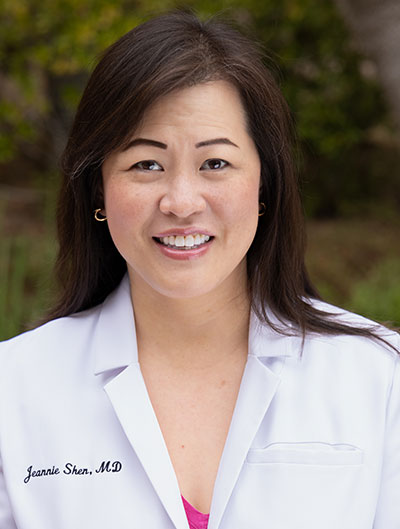
October is Breast Cancer Awareness Month, a time to highlight breast cancer prevention, treatment and care. For many people, the diagnosis of breast cancer in itself, can be a shock – leaving people unsure of where to begin their breast cancer care journey. Fellowship-trained breast surgeon, Jeannie Shen, MD, Regional Medical Director of the Breast Program and International Health at the Huntington Cancer Center, an affiliate of Cedars-Sinai Cancer, offers her advice to help navigate the initial diagnosis and tips to help find the right breast surgeon for you.
Huntington: What should patients look for in a breast surgeon?
Dr. Shen: A breast surgeon should be knowledgeable, compassionate and willing to spend time with their patient and patient’s family to help them understand the diagnosis and treatment options. Treatments for breast cancer are evolving so rapidly – with clinical studies in screening/diagnostics, perioperative enhanced recovery after surgery protocols, new “de-escalated” surgical techniques, shorter radiation protocols and new systemic medications. A surgeon who takes care of breast cancer patients should have knowledge of these studies and be able to translate that knowledge into a language that helps patients understand their choices. Surgeon’s love being in the operating room, but as a breast surgeon, the time we spend with patients in the office is equally as important.
Huntington: How do you customize your breast cancer treatment for the patient?
Dr. Shen: No two patients are alike, and decisions regarding an optimal surgical plan, need for/type of/duration of radiation, chemotherapy and hormonal therapy and balancing effectiveness while minimizing side effects of medical therapies are all unique to that individual. Additional considerations may include:
- Genetic testing: Because most breast cancer is not hereditary, genetic testing is not currently recommended for every breast cancer patient. Criteria for genetic testing include diagnosis before age 50, three or more relatives with breast cancer diagnosed at any age, history of ovarian cancer, pancreatic metastatic prostate cancer and melanoma, or male breast cancer in the family. The Cedars-Sinai Clinical Cancer Genetics team provides counseling and testing (if indicated) at the Huntington Cancer Center. Patients can be referred through their surgeon, radiologist, medical oncologist or primary care physician. For patients who meet criteria for testing, most major insurance plans will cover the cost of testing. For those patients whose insurance does not cover the cost of testing, affordable payment options are available.
- Side effects: Patients should ask their physician about anticipated side effects and inquire about treatments available to help alleviate these side effects.
- Integrative oncology: This is defined as incorporating complementary therapies (e.g., acupuncture, massage therapy, guided meditation) to standard care with the goal of helping to alleviate the side effects of surgery, radiation and medications. While medications can help relieve these symptoms, often patients are reluctant to take another prescription medication just to alleviate the side effects of the first medication. Studies show that integrative oncology therapies can be very effective in helping relieve symptoms and improve quality of life in breast cancer survivors.
- Transportation: While we are fortunate to be able to care for patients right here in the San Gabriel Valley, it’s important that patients have access to transportation to and from treatment should they need assistance. Huntington Cancer Center works with the American Cancer Society to offers transportation for select patients, based on individual need and availability of resources.
- Clinical trials: As an affiliate of Cedars-Sinai, the Huntington Cancer Center has active trials evaluating new options for surgery, radiation and systemic (medical) therapies. Clinical trials can help test new ways to prevent, diagnose and treat cancer, help researchers learn more about cancer to aid future patients, develop new treatments for cancer, improve quality of life for people with cancer, and give participants access to the latest advances in treatment that are under study which may not be available to people outside the trial. Studies show that high-enrollment rate to clinical trials leads to faster treatment advances and improvement in cancer outcomes and quality of life for cancer survivors.
Thank you, Dr. Shen for this excellent information! Unfortunately, breast cancer is still common, according to the American Cancer Society, 1 in 8 women will develop breast cancer in her lifetime (to age 90). Huntington Cancer Center physicians and nurses work tirelessly to ensure that patients are offered access to the latest treatments available, tailored to their specific needs, as well as support groups and resources. For more information about breast cancer care at Huntington Cancer Center, go to www.huntingtonhealth.org/cancer.
Jeannie Shen, MD, is a board-certified general surgeon and a fellowship-trained breast surgeon with two decades of experience. She serves as regional medical director of the breast program at Huntington Cancer Center and medical director of Huntington Hospital International Health.
 English
English Espanol
Espanol 简体中文
简体中文 Tagalog
Tagalog հայերեն
հայերեն 한국인
한국인 Tiếng Việt
Tiếng Việt فارسی
فارسی русский
русский 日本
日本 عربي
عربي